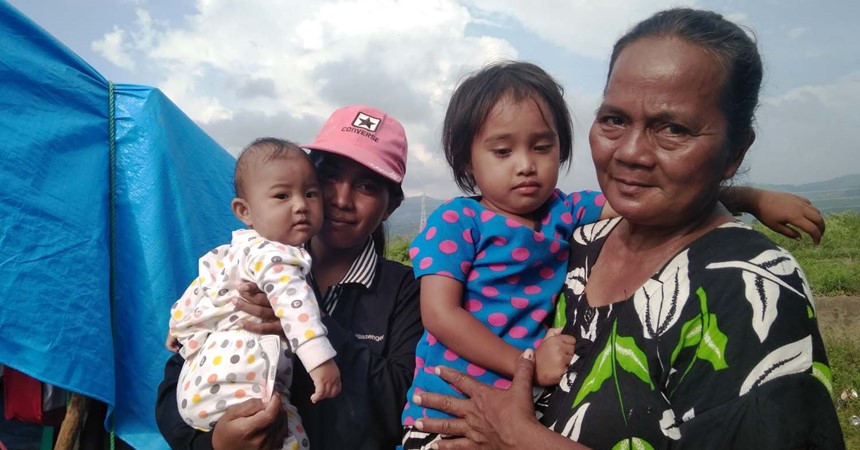What happened?
- A magnitude 7.5 quake struck on 28 September, 2018 just off the coast of Dongala in Sulawesi, a Central Indonesian island
- the earthquake triggered a tsunami, with waves of up to six-metres impactingPalu, Donggala, Mapaga, Gorontalo and Poso. There was also a series of strong aftershocks
- Indonesian goverment reports, at of 30 October, estimate 2,096 people dies with more than 10,000 seriously injured
- up to 2.4 million people were affected
- several mosques, a shopping mall and many houses collapsed
- over 87,000 people were displaced and forced to take shelter or make up informal camps
- in the most heavily affected areas, Caritas Australia's partner, Catholic Relief Services, notes that up to 80% of houses have been completely damaged. Displaced families are settling in a scattered manner which makes it difficult to confirm their numbers and location.
What is needed the most?
- Basic essential needs are: food. emergency shelters, water, emergency latrines and medical care
- Indonesian authorities estimate around 50 million AUD is required to meet essential needs
- other supplies required are: instant foods; baby and children foods; emergency shelter tents; tarpaulins and blankets
- the Australian government has pledged 5 million AUD to Indonesia
- according to WHO's situation update, between 4 - 6 October, 2018, an increased number of acute diarrhea and acute respiratory infections have been observed. Other disease reported are influenza-like illnesses, injury, pneumonia, hypertension, skin diseases and mental health issues.
How is Caritas helping?
30 October Update:
Relief operations continue, with Caritas Australia and its partners Caritas Indonesia - Karina and Catholic Relief Services (CRS) working closely together to access hard-to-reach areas and meet the urgent needs of the most vulnerable.
They have already distributed essential food and non-food items to 6,000 households, as well as 9,900 tarpaulins and 2,000 kits of household and hygiene supplies to affected families.
CRS and Caritas Indonesia (Karina) aim to provide immediate relief to over 10,000 families, through the direct distribution of supplies or, in areas where markets are functioning, through cash assistance allowing people the flexibility to purchase items of greatest need for their families.
In some villages, the public water system exists, but the piping channel has broken and needs repair. Rehabilitation and the clean-up of wells have been identified as the main priorities to improve access to clean water for drinking and washing.
CRS and its local partners are prioritising the distribution of water kits and hygiene supplies, while waiting for the full rehabilitation and clean-up of wells. They are also procuring water tanks to facilitate water access.
CRS hopes to assist over 190,000 people over the next three months.
Caritas Austalia, is also the lead agency of the CAN DO (Church Agencies Network – Disaster Operations), a consortium of eight church agencies. Working together, Caritas/CAN DO is able to coordinate and connect with local communities via its vast network of long-established partnerships with local churches and governments to increase the spread and impact of its humanitarian efforts.
How can you donate?
Please CLICK HERE to donate.
How else can you help?
Don’t: Send food, toys and clothing directly
It is important that international responses are coordinated with local government and local institutions like churches, so that the most effective response can be delivered, ensuring the people most in need are able to get support.
Sending goods directly can also negatively impact local markets and compete with people trying to make a living in difficult circumstances.
Don’t: travel to emergency sites to volunteer
Unless you are from the area, you are more likely to be in the way of the local people who know the area, understand the need and will be there for the long term.
Emergencies are stressful and complicated events, and many people will be at high levels of risk. Well-meaning people can inadvertently make things worse, disrupting coordinated efforts and putting people at greater risk.
Do: contribute through agencies that are well positioned to respond
Donations are vital to saving lives and helping people re-build.
If possible, support credible agencies that have a history of working in the affected area, have local networks that enable them to assess damage and respond quickly, and support longer term efforts to build back better.
Do: support disaster risk reduction, including through action on climate change
Reducing the impact of emergencies is possible. Programs of disaster risk reduction can help people build more resilient homes, plan ahead for emergencies and teach their children how to stay safe. Action on climate change in our own country is an essential part of reducing the severity and regularity of extreme weather events.
What to do next
Please use Caritas' prayer resource HERE.

